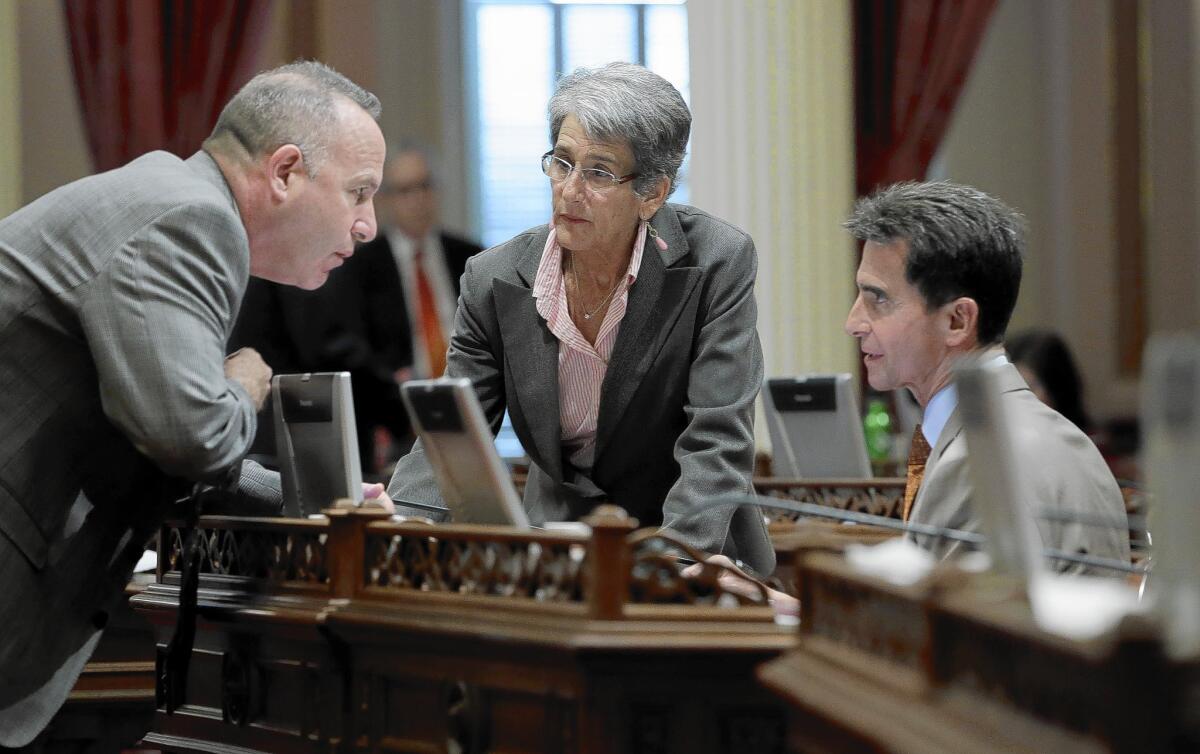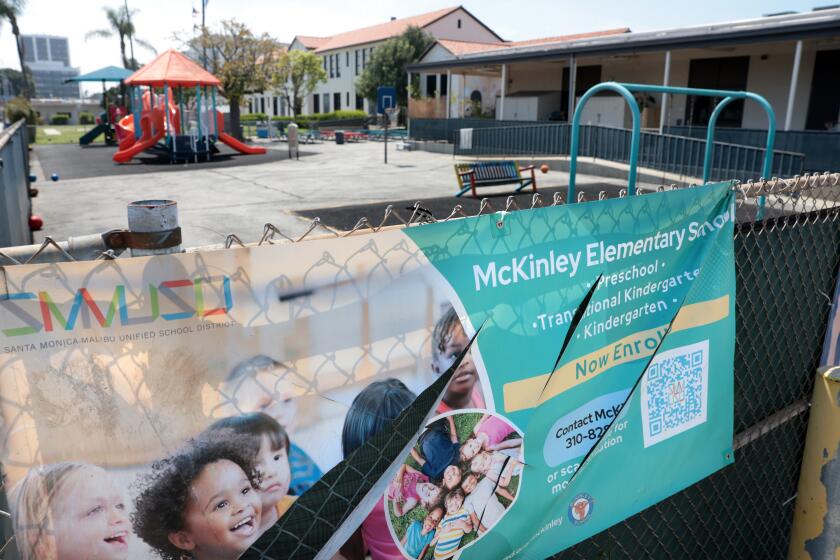Plastic bag ban, paid sick days among issues still before Legislature

With one week remaining until they adjourn for the year, California legislators have saved the hardest votes for last.
By midnight Aug. 31, they must address such contentious issues as whether to ban plastic carryout bags from supermarkets statewide, require employers to give workers at least three paid sick days a year and allow courts to order guns to be confiscated from people deemed dangerous.
And as California’s drought continues, lawmakers will decide the fate of a proposal for state management of underground water supplies. They also will determine whether to ask voters in two years to repeal portions of the state’s English-only education law.
“The final week of session is always eventful,” said Senate leader Darrell Steinberg (D-Sacramento), noting that 390 bills await action, “and there are still significant issues we have to tackle.”
Some polarizing bills have been shelved, including proposals to regulate medical marijuana and legalize Internet poker. On many of the issues that remain, special interests and their lobbyists have turned up the pressure on lawmakers.
Hollywood directors and actors staged a faux film shoot on the steps of the Capitol last week to draw attention to their demand for $400 million in tax credits for those who film in California.
Robed and masked medical workers had staged a mock surgery on the same steps a day earlier, to illustrate their desire for two bills that union leaders say would improve surgical safety and patient nutrition.
Immigrant-rights activists have demonstrated in favor of a proposal for $3 million in legal aid for some of the thousands of unaccompanied children from Central America who have immigrated to the U.S. illegally in recent months.
And some plastic-bag makers have aired television and radio ads throughout the state, urging voters to contact legislators and “say no to their bag scam.” The ads maintain that the proposed ban would cost the state jobs and is aimed at enriching supermarkets that could charge customers 10 cents for a paper bag or sturdier plastic container.
Sen. Alex Padilla (D-Pacoima) last week agreed to amend the plastic-bag bill, which he introduced, to ensure that the fee would be used to pay for the alternate bags and other costs of implementing the measure, SB 270.
The senator said the bill now strikes the right balance: “It will protect the environment, and it will protect California jobs as the state transitions to reusable bags.”
Padilla noted that the proposal includes $2 million in competitive loans to businesses that would transition to the manufacture of reusable bags.
A top priority for labor groups is the sick-leave measure. Unions have sought such a mandate for years.
Business groups have been less enthused; the California Chamber of Commerce branded it a “job killer,” making it a prime lobbying target. But a late round of proposed amendments has addressed some of their concerns.
For example, the changes would allow employers to keep existing policies — which may have different accrual rates from what the bill prescribes — as long as they offer a minimum of three paid days.
Denise Davis, the chamber’s spokeswoman, said, “We anticipate removing the job-killer tag” once the changes are officially made to the bill, AB 1522 by Assemblywoman Lorena Gonzalez (D-San Diego), early this week.
The Institute for Women’s Policy Research, a Washington think tank, found that 44% of California workers have no paid sick days, according to a study to be released this week.
Another interest group, the gun lobby, has been out in force to oppose a bill that would allow law enforcement officials and family members to petition the courts for a special restraining order against individuals thought to be dangerous to themselves or others. The order would allow the individual’s firearms to be confiscated.
Assemblywoman Nancy Skinner (D-Berkeley) proposed the bill, AB 1014, in response to the rampage in Isla Vista in May, when a disturbed man killed six UC Santa Barbara students and wounded 13.
Sen. Kevin de León (D-Los Angeles) proposed that Californians who buy ammunition be required to obtain a permit showing they have undergone a background check and can legally own guns. But he said Gov. Jerry Brown opposed the permit idea, so De León amended his bill, SB 53, on Friday to remove the pre-sale check. Instead, sellers would send records of sales to the state Department of Justice, which would review the buyers’ backgrounds. Authorities could get a warrant to confiscate the ammunition from anyone found to be barred from gun ownership.
De León said in a statement that a background check is the best way to make sure criminals are not buying ammunition. But “if the governor is not willing to support that at this time,” he said, “I am willing to track down criminals after the fact, as they’ve done to great effect in the city of Sacramento.”
An ambitious effort to manage California’s groundwater could produce the first statewide regulation of that resource in the state’s history.
That package, which consists of AB 1739 by Assemblyman Roger Dickinson (D-Sacramento) and SB 1168 by Sen. Fran Pavley (D-Agoura Hills), would direct local agencies to develop plans for managing their underground supplies. It also would give state agencies the ability to step in if local agencies failed to act.
The Brown administration has been active in crafting the legislation, and key interests including environmentalists and water districts also support it. Farm groups have remained opposed, citing wariness of state intervention.
Lawmakers could also move toward a partial repeal of an initiative voters passed in 1998 that requires all public school students to be instructed in English. Legislation by Sen. Ricardo Lara (D-Bell Gardens), chairman of the Latino Legislative Caucus, would place a proposal on the 2016 state ballot to dismantle that mandate and expand multilingual education programs.
If voters approved, parents would have more power to decide which language programs best suit their children. The proposal, SB 1174, has passed the Senate and awaits a vote in the Assembly.
In addition to these measures, lawmakers are expecting a crop of “mushroom” bills, last-minute proposals that seem to sprout in the dark of night during the waning hours of the legislative year.
One that could sprout, according to legislative sources not authorized to speak on the matter, would propose a waiver of fees for construction firms working on school projects as a consolation for the decision by legislators last week to scrap a $4.5-billion bond measure for school construction.
Twitter: @mcgreevy99
Twitter: @melmason
More to Read
Start your day right
Sign up for Essential California for news, features and recommendations from the L.A. Times and beyond in your inbox six days a week.
You may occasionally receive promotional content from the Los Angeles Times.








